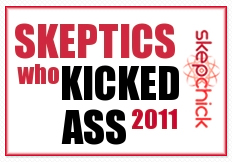Following on from a parliamentary committee recommending all public funds be withdrawn from homeopathy in the UK, members of the British Medical Association have declared the alternative medicine to be “witchcraft” and demanded a ban.
Hundreds of members at the British Medical Association’s (BMA) annual conference of junior doctors have passed a motion attacking the alternative medicine and other remedies they claim have no scientific basis to support them.
Dr Tom Dolphin, deputy chairman of the BMA’s junior doctors committee in England, told the conference:
“Homeopathy is witchcraft. It is a disgrace that nestling between the National Hospital for Neurology and Great Ormond Street [in London] there is a homeopathic hospital paid for by the National Health Service (NHS)”.
The NHS is the equivalent of Medicare in Australia.
The announcement supports recommendations from the The House of Commons Science and Technology Committee after a parliamentary enquiry called an “evidence check”. In a 273 page report, summarising the evidence for the efficacy of homeopathy, the committee concluded that
* The NHS should cease funding homeopathy
* Recommend no further clinical trials of homeopathy.
* Evidence shows homeopathy doesn’t work.
* Explanations for why homeopathy works are “scientifically implausible.”
* Committee views homeopathy as placebo.
The report was tabled with evidence from hundreds of submissions from scientists.
From the report, the Committee wrote;
“In our view, the systematic reviews and meta-analyses conclusively demonstrate that homeopathic products perform no better than placebos.”
The Committee concluded;
“Given that the existing scientific literature showed no good evidence of efficacy that further clinical trials of homeopathy could not be justified.”
“We do not doubt that homeopathy makes some patients feel better. However, patient satisfaction can occur through a placebo effect..When doctors prescribe placebos, they risk damaging the trust that exists between them and their patients.”
Gordon Lehany, chairman of the BMA’s junior doctors committee in Scotland, said it was wrong that some junior doctors were spending part of their training rotations in homeopathic hospitals, learning principles that had no place in science.
He told the conference in London:
“At a time, when the NHS is struggling for cash, we should be focusing on treatments that have proven benefit. If people wish to pay for homeopathy that’s their choice, but it shouldn’t be paid for on the NHS until there is evidence that it works.”
The UK currently had four NHS funded homeopathic hospitals, in Liverpool, Bristol, Glasgow and London. A fifth hospital in Kent closed in 2009 when NHS funding was withdrawn. Latest figures show 54,000 patients are treated each year at four NHS homeopathic hospitals at an estimated cost of £4 million.
Homeopathy was invented 200 years ago by the German physician, Dr. Samuel Hahnemann, and is based on a ‘like-treats-like’ concept: that the symptoms of an illness can be treated by minute quantities of the same substance that caused it. But remedies are diluted to such a degree, there is virtually no chance of the active ingredient existing in the final product.
The concept of “Homeopathy, there’s nothing in it” made headlines around the world last year when mass homeopathic overdoses were conducted outside of pharmacies across the globe. The campaign was organised in protest at the highly respected Boots chain of pharmacies in the UK selling their own range of homeopathic “remedies”.
During the parliamentary evidence check, the professional standards director for the Boots high street pharmacy chain, Paul Bennett admitted to selling homeopathic remedies because they are popular, not because they work. In a statement, which has since been referred to as a huge foot-in-mouth, he said;
“There is certainly a consumer demand for these products,” but “I have no evidence to suggest they are efficacious”.
Homeopathy also publicly funded in Australia
In Australia, homeopathic consultations are not directly covered by Medicare, but GPs can bill for any consultation deemed “by the majority of professional peers as clinically relevant”, a Medicare spokesperson said.
Dr Ken Harvey, of the school of public health at La Trobe University, objects to the use of public money on placebo;
“I don’t believe there’s an evidence base to homeopathy, and I don’t think it should be financed by public money,”
“If a doctor wants to offer homeopathic consultations then it should be done separately…at the patient’s own expense.”
Dr Harvey referred to a New South Wales GP who offers homeopathy consultations as being fully reimbursed by Medicare. The GP, Dr Michael Cleary was adamant;
“The people who are using [homeopathy] are [also] taxpayers,” he said.
“If I was a person who wasn’t allowed to get a Medicare rebate from seeing my [homeopathic] doctor, I’d be wondering why I’m paying the levy.
Professor Mike Daube, president of the Public Health Association of Australia, also called on the TGA and Department of Health to conduct a review of homeopathy.
“There’s a long history to homeopathic practice, but we need to know whether it’s appropriate in the light of 21st-century science,” he said.





